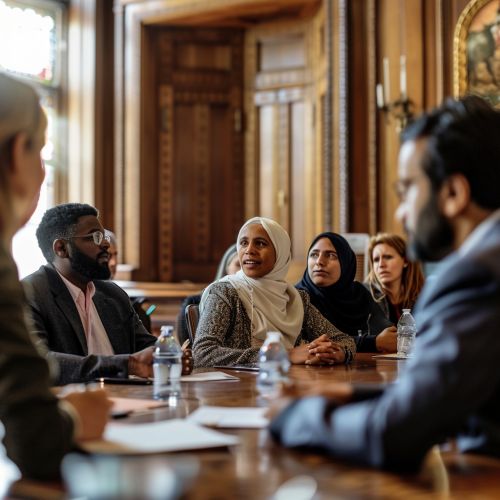International Federation for Human Rights
History and Formation
The International Federation for Human Rights (FIDH) was established in 1922, making it one of the oldest international human rights organizations in the world. It was founded by a coalition of human rights activists and organizations who sought to create a global network dedicated to the promotion and protection of human rights. The founding members recognized the need for a coordinated effort to address human rights abuses and to advocate for the establishment of international human rights standards.
Organizational Structure
FIDH operates through a decentralized structure that includes a General Assembly, an International Board, and a Secretariat. The General Assembly, which meets every three years, is the highest decision-making body and consists of representatives from FIDH's member organizations. The International Board, elected by the General Assembly, is responsible for implementing the organization's policies and strategies. The Secretariat, based in Paris, coordinates the day-to-day activities and provides support to member organizations.


Mission and Objectives
The mission of FIDH is to promote respect for all the rights set out in the Universal Declaration of Human Rights. FIDH aims to achieve this through a variety of objectives, including:
- Monitoring and documenting human rights violations.
- Providing support and solidarity to victims of human rights abuses.
- Advocating for the implementation of international human rights standards.
- Strengthening the capacity of member organizations.
- Promoting the establishment of effective mechanisms for the protection of human rights at the national, regional, and international levels.
Key Activities
Monitoring and Documentation
FIDH conducts extensive monitoring and documentation of human rights violations around the world. This involves field missions, fact-finding investigations, and the publication of detailed reports. These reports are used to raise awareness, inform advocacy efforts, and hold perpetrators accountable.
Advocacy and Lobbying
FIDH engages in advocacy and lobbying at various levels, including national governments, regional bodies, and international institutions such as the United Nations. The organization works to influence policy and legislative changes that promote and protect human rights. FIDH also participates in international forums and submits reports to human rights treaty bodies.
Legal Action
FIDH supports legal action to address human rights abuses. This includes providing legal assistance to victims, supporting strategic litigation, and advocating for the prosecution of perpetrators of human rights violations. FIDH has been involved in landmark cases before national and international courts, including the International Criminal Court.
Capacity Building
FIDH provides training and capacity-building programs for its member organizations. These programs aim to enhance the skills and knowledge of human rights defenders, enabling them to effectively document violations, advocate for change, and provide support to victims. Capacity-building initiatives also focus on organizational development and sustainability.
Regional and Thematic Focus
FIDH operates on a global scale, with a presence in over 100 countries. The organization addresses a wide range of human rights issues, including:
- Civil and political rights.
- Economic, social, and cultural rights.
- Women's rights.
- Children's rights.
- Rights of migrants and refugees.
- Rights of indigenous peoples.
- Environmental rights.
FIDH also focuses on specific regions, tailoring its activities to address the unique human rights challenges faced in different parts of the world. This regional focus allows FIDH to develop targeted strategies and build strong partnerships with local organizations.
Impact and Achievements
Over the years, FIDH has made significant contributions to the promotion and protection of human rights. Some of its notable achievements include:
- Contributing to the establishment of the International Criminal Court.
- Advocating for the adoption of international human rights treaties and conventions.
- Supporting the creation of national human rights institutions.
- Providing assistance to thousands of victims of human rights abuses.
- Raising awareness of human rights issues through publications, campaigns, and media outreach.
Challenges and Future Directions
Despite its successes, FIDH faces numerous challenges in its work. These include:
- Political and security risks for human rights defenders.
- Limited resources and funding constraints.
- Resistance from governments and other powerful actors.
- The complexity of addressing systemic and structural human rights issues.
Looking ahead, FIDH aims to strengthen its global network, enhance its advocacy efforts, and continue to innovate in its approach to human rights protection. The organization is committed to adapting to new challenges and seizing opportunities to advance its mission.
